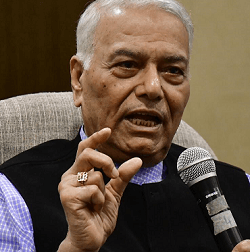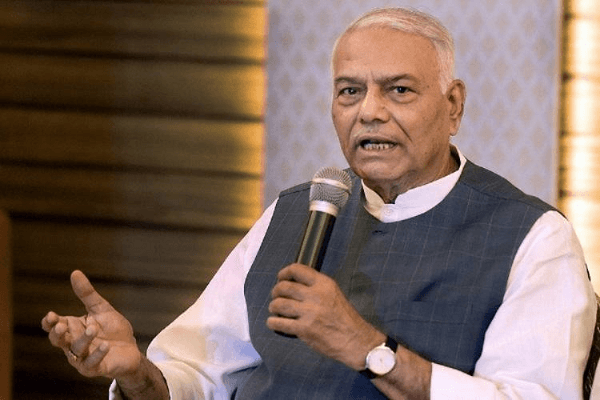Yashwant Sinha
Yashwant Sinha is a famous Indian IAS officer and a politician born on 6 November 1997 in Patna in Bihar. Sinha was elected as the fifth presidential candidate after he served in many government authorities. Sinha was born in a middle-class family. In an interview, Sinha said while talking about his childhood that he had always wanted to serve the nation. Sinha was also elected as the finance minister on 21 November 1990 and worked under Chandra Shekhar, the prime minister at that time. After that, he was again elected as minister of finance from 1998 to 2002 and operated under Atal Bihari Vajpayee. Sinha was the famous and influential leader of the BJP but left the BJP party on April 21, 2018. Yashwant joined the civil services in 1960 by securing AIR 12th rank in the Union Public Service Commission Exam (UPSC) and got Indian administration services. Yashwant enrolled in the All Indian Trinamool Congress in March 2021. However, he resigned in June 2022 when the combined opposition parties selected him as their presidential candidate for the 200 presidential elections. Birth PlaceSinha was born in a middle-class family belonging to the Kayastha family of Patna, Bihar in India, on 6 November 1997. Education DetailsYashwant completed his schooling in Patna and then pursued his graduation from the University of Patna with BA Hons in History. Later, he completed his master's degree in political science in 1958, and after that, Yashwant prepared for the civil service exam. Marital Status & FamilyYashwant was married to Nilima Sinha, who was an author at that time. They have two sons, Jayant Sinha and Sumant Sinha. Jayant is also a politician, while Sumant Sinha is a businessman. Yashwant also has one daughter named Sharmila, and she is a writer. Personal LifeSinha was born in a middle-class family. In an interview, Sinha told the media that he went to serve the nation from an early age. He was born in a Bihari family and is interested in reading books and writing novels. He also likes to socialise with new people. He likes to travel all over the state, and in an interview, he said he wants to travel worldwide. He has travelled far in his political career and served as the leader of several political and social organisations. On behalf of India, he took the initiative in several agreements. His wife, Nilima Sinha, is known as one of the best writers and authors who was the president of the writer and the author association for Children earlier. Their daughter, Sharmila, followed her mother's passion and became a writer. Civil Service CareerSinha was born in a middle-class family in Patna, but he wanted to serve the nation since childhood, so he decided to become a civil servant. He pursued his graduation from the University of Patna with BA Hons in history, and after that, he completed his master's degree in political science in 1958. Later, Sinha started preparing for the civil service examination. He joined the Indian administrative service in 1960 by securing the AIR 12th rank in Union Public Service Commission (UPSC) civil service exam. Sinha served the nation as a civil servant for about 24 years. During his work, he also secured a higher post in services; he served as a sub-divisional magistrate (SDM) for three years and was later promoted to the district magistrate for about four years. Yashwant also worked as an undersecretary and deputy secretary in the role of finance head in the finance department under the Bihar government for nearly almost two years. Afterwards, Sinha served in the commerce department as the role of deputy secretary under the government of India. He worked in many departments in his civil service career. He joined the Indian embassy as the first secretary in Bonn, west Germany, between 1971 and 1973. Between 1973 and 1974, he served as the Indian Consul General in Frankfurt. Yashwant gained experience over more than seven years in finance. He gained knowledge of issues involving international trade and India's interactions with the European Economic Community. After that, he worked in the Ministry of Industry, Government of India, where he offered technology imports, industrial approvals, intellectual property rights, and industrial collaborations in remote places. He also laboured for the Bihar State Government's Department of Industrial Infrastructure. Later, Yashwant was promoted to the joint secretary from 1980 to 1984, where he served as Joint Secretary to the Government of India in the Ministry of Surface Transport. His primary responsibilities included shipping, ports, and road transport. But, in 1984, he left his position. Political CareerJoining Janata DalYashwant worked as a joint secretary from 1980 to 1984. Soon after, he resigned from his civil services in 1984 and enrolled in the active politics group as a member of the Janata party. He was elected as the all-Indian general secretary of the party in 1986. He was chosen to serve in the Rajya Sabha, the upper house of the Indian Parliament, in 1988. When the party was created, he was elected as the Janata Dal's General Secretary. From November 1990 to June 1991, he served as Chandra Shekhar's Cabinet's Minister of Finance. After joining the Bhartiya Janta Party (BJP)Yashwant joined the Bhartiya Janta Party in June 1996. He was appointed as the BJP's national spokesperson. He joined the Lok Shaba as the BJP candidate from Hazaribagh in the following consecutive years: 1998, 1999 and 2009. Sinha also served as the finance minister in 1998. Later, he was elected on July 1st, 2002, as the Minister of External Affairs. In the 2004's Lok Sabha elections, Prashant Sahay, the talented grandson of K B Sahay, helped Yashwant to win the elections. After that, in 2005, Sinha returned to Parliament. He resigned as the BJP's vice president on June 13, 2009. However, he remained with the party till 2017. He finally left the BJP in 2018. It is claimed that he left BJP because the party denied him a ticket for the Lok Sabha elections. Yashwant Sinha's biography "Drohkaal Ka Pathik" was released in November 2013. To join the NDA in 2001, three Indian Federal Democratic Party members, according to former lawmaker Pappu Yadav, allegedly received financial assistance from the then-finance minister Sinha. Additionally, there was an allegation on Yashwant that he was accused of taking part in the UTI (Unit Trust of India) scandal. After attempting to organise a religious parade on April 4, 2017, Sinha, BJP MLA Manish Jaiswal, and 150 other people were imprisoned in the Hazaribagh district. His followers allegedly threw stones at the police when the officers stopped them. 
TMC and 2022 Presidential CampaignYashwant joined the Trinamool congress in March 2021; he enrolled in TMC because he wanted to defeat BJP before the 2021 west Bengal election. Yashwant was elected as the vice president of Mamata Banerjee's party on 15 March 2021. He was also selected as the presidential candidate. He became the first AITC/TMC leader to be nominated for the presidency when he was chosen unanimously against the opposition for the 2022 Presidential Election. Yashwant as the Finance MinisterYashwant was elected as the finance minister in July 2002, when he switched posts with foreign minister Jaswant Singh. During his time in office, Sinha was criticised heavily for being compelled to reverse several of his government's main policy achievements. However, Sinha is widely acknowledged for advancing several significant reform initiatives that placed the Indian economy on a stable development trajectory: actual interest rates have been lowered, mortgage interest is tax deductible, the telecommunications business has been opened up, and money is being provided for the National Highways Authority, and the petroleum industry has been deregulated. Yashwant is well-known for breaking with tradition. This custom dated back to the British Colonial era and was intended to present the Indian budget at a time that would be convenient for the British Parliament. The book Confessions of a Swadeshi Reformer, written by Sinha, is a thorough description of his time as Finance Minister. Opponents and other political observers have accused Yashwant Sinha of seeking to advance nepotism by choosing his son Jayant Sinha to run for office in Hazaribagh over the interests of many other devoted party members. He has attempted to defend the nomination of his son as a party choice.
Next TopicAmrita Rao
|
 For Videos Join Our Youtube Channel: Join Now
For Videos Join Our Youtube Channel: Join Now
Feedback
- Send your Feedback to [email protected]
Help Others, Please Share









